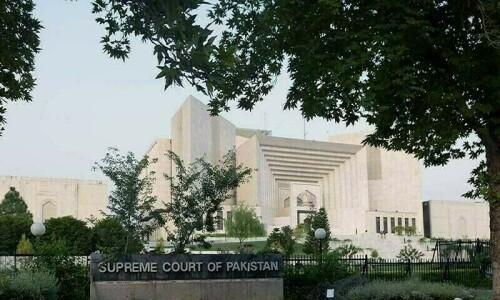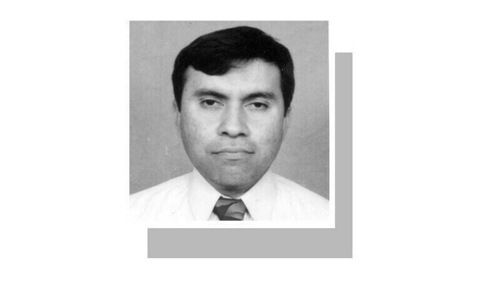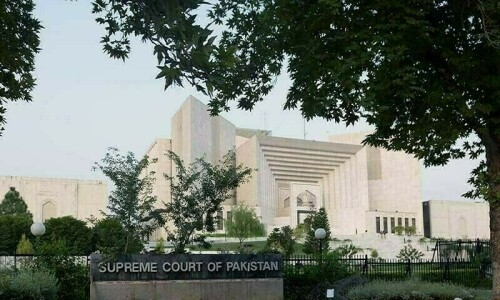WASHINGTON, Oct 9: Al Qaeda, which once only recruited Arabs, is now also seeking recruits from other ethnic groups and many new Al Qaeda operatives are from Pakistan, says a report published in some US newspapers on Saturday.
The report quotes Karachi police chief Tariq Jameel as saying that the change in Al Qaeda s strategy has made it difficult for security agencies to monitor the profiles of these new recruits and new groups.
According to this report, based on interviews with security officials and some Al Qaeda suspects in Pakistan, new Al Qaeda cells are small. Most of them have less than 10 members and are independent of each other to ensure that if one group is busted, others can still work.
Attaur Rehman and nine of his accomplices, who are charged with carrying out a deadly attack on the Corps Commander Karachi in June, are also listed in this report as Al Qaeda operatives. The report says that their group, Jundullah, is a good example of how Al Qaeda has changed its strategy since 9/11.
Although the Jundullah receives orders from senior Al Qaeda leaders, it has no direct association with Al Qaeda or any other group associated with the network. That's why the arrest of Rehman and his accomplices could not lead police to other Al Qaeda cells.
Rehman, a university graduate who is now facing a death sentence on terrorism charges, was the leader of this group, although he does not fit the typical profile of an Al Qaeda leader. He is not an Arab. He did not go to a madressah and does not have a long association with any Islamic movement.
But the report says that as Al Qaeda's leadership ranks begin to thin, men such as Rehman are starting to climb the ladder. The report quotes Karachi police officials as saying that Pakistan's newly organized jihadis and educated radicals might number in the hundreds. Many of an estimated 600 suspected Al Qaeda militants rounded up in Pakistan over the past three years are Pakistanis, the police say.
But some Pakistanis, like computer expert Mohammad Naeem Noor Khan, have been associated with Al Qaeda since before 9/11. Naeem is believed to have played an important role in planning terrorist attacks in the United States and Britain before he was arrested in Lahore on July 13.
Naeem helped Al Qaeda operatives send encrypted messages over the internet. The information he provided led to the July arrest in Britain of suspected Tanzanian terrorist Ahmed Khalfan Ghailani and a top Al Qaeda operative, Musa el Hindi.
The report says new Al Qaeda recruits also come from Pakistani and Kashmiri militant groups such as Al-Badr, Harakatul Mujahideen, Jaish-i-Mohammed, and Lashkar-i-Jhangvi.
Although the new groups do not have direct access to top Al Qaeda leadership, they do receive funds from the network. Each jihadi depending on his performance is paid $170 to $340 a month.
To recruit, Al Qaeda leaders rely on trusted contacts, preferably people who have fought alongside Arabs or have been trained by them, said a senior Karachi police investigator.
The go-between appoints a group of leaders, who in turn hire the services of members and assign tasks mostly on the instructions coming from the go-between. Amad Farooqi, a top militant reportedly killed by security forces two weeks ago, was a main recruiter.
A veteran of the Afghan resistance in the early 1990s, he linked up with Al Qaeda operatives after 9/11. Security forces arrested about 10 suspected Al Qaeda-linked Pakistani militants following the interrogation of two arrested Farooqi accomplices.
To bolster secrecy, group members do not know the real names of their comrades, and only group leaders know the whereabouts of other members. Suicide bombers are mostly young and usually live and operate separately.
The growing influence of militant groups within the law enforcement agencies has also set alarm bells ringing. Three policemen acted as suicide bombers at mosques in Karachi and Quetta.
Several low-ranking personnel from the armed forces were arrested for their suspected involvement in the foiled assassination attempt against President Pervez Musharraf, the report said.














































Dear visitor, the comments section is undergoing an overhaul and will return soon.